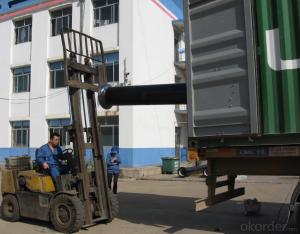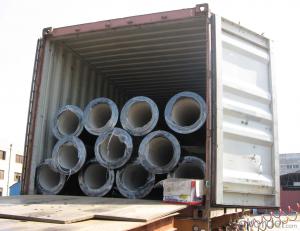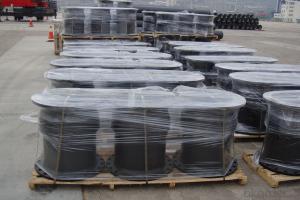DUCTILE IRON PIPES K8 DN250
- Loading Port:
- China Main Port
- Payment Terms:
- TT OR LC
- Min Order Qty:
- -
- Supply Capability:
- -
OKorder Service Pledge
OKorder Financial Service
You Might Also Like
Ductile Iron Cast Pipe is without any defects compare with tradition casting tech, which has many advantages particularly as follow:
(1) High density. In the "vertical upward casting" process, the melt iron of centre liquid column in center crystallizer is continuously feeding for volume shrinkage caused by condensation tube at outer circumference , which lead to be free of shrinkage porosity.
(2) High purity. When melt iron pouring, the mixed impurities such as gas, dross, sand grain which are lighter than melt iron could be eliminated at furnace mouth, its impossible to enter into the crystallizer through the channel, so the melt iron into the crystallizer is very pure.
(3) Strength with toughness. The cooling speed provided by continuous crystallizer is 30 times than sand casting and 5 times than centrifugal casting, and doesn't produce white iron, the eutectic cell volume of continuous cast iron is one eighth to one tenth compare with traditional cast iron. The density of graphite nodule in ductile iron can reach 300-700 pcs/mm2. Therefore, all reason above improve the strength and toughness of continuous cast iron.
(4) Free machining. The high speed cooling make the hardening phase (such as boride, steadite) not appear like reticular, massive or thick, but diffuse like fish bone and pane in shape, moreover, there are tiny graphite flakes inlaid hardening phase. It's free machining in BrinellHardness the range of 250-300HB. However, the Brinell Hardness of 250 is top limit to common metal materials.
(5) Uniform composition of tube wall. The convection mixing of liquid column caused by marching type drawing in crystallizer make the composition of tube wall well-distributed, and concentration gradient very little.
(6) High productivity. To the wall thickness of tube under 10mm, the speed of continuous casting is 1 meter/min, to the wall thickness of tube under 20mm, the speed of continuous casting is 0.5 meter/min, which is high efficiency that centrifugal or other casting tech couldn't reach.
- Q:Are ductile iron pipes suitable for underground parking structures?
- Yes, ductile iron pipes are suitable for underground parking structures. They are strong, durable, and resistant to external pressures, making them ideal for use in underground environments where they can withstand heavy loads and potential ground movements. Additionally, ductile iron pipes have excellent corrosion resistance, ensuring long-term performance and minimal maintenance in underground parking structures.
- Q:What does ductile iron pipe "ND200" mean?
- The nominal pipe diameter and the inner diameter and the outer diameter were not equal, for example: the nominal diameter of 100MM seamless steel pipe 102*5, 108*5 several, 108 for the outer diameter of pipes, 5 said that the wall thickness of the tube, therefore, the pipe diameter (108-5-5 = 98MM), but it is not completely equal to pipe diameter minus two times the wall thickness difference, it can be said that the nominal diameter is close to the diameter, but not equal to the diameter of a pipe diameter specifications on the design drawings, so we use the nominal diameter, the purpose is to determine according to the nominal diameter pipe, flange and gasket structure and size connecting dimensions, nominal diameter is represented by the symbol DN, if the diameter of said in the design drawings, piping specifications should also make the table, show that the nominal diameter of a pipe wall thickness.
- Q:How are ductile iron pipes protected against stray current corrosion?
- Ductile iron pipes are protected against stray current corrosion through the implementation of various measures. One common method is the installation of a protective coating, such as an epoxy or zinc coating, on the external surface of the pipes. This coating acts as a barrier, preventing direct contact between the pipe and the surrounding soil or water. Additionally, cathodic protection systems, such as impressed current or sacrificial anode systems, can be employed to further protect the pipes. These systems help to control and redirect stray currents, minimizing their impact on the ductile iron pipes and preventing corrosion.
- Q:How do ductile iron pipes handle heavy traffic loads?
- Ductile iron pipes are known for their exceptional strength and durability, making them well-suited to handle heavy traffic loads. Their high tensile strength and resistance to cracking or breaking under pressure allow them to withstand the weight and stress generated by heavy traffic. Additionally, the flexible nature of ductile iron allows it to absorb and distribute the load, reducing the risk of damage or failure. Overall, ductile iron pipes are a reliable choice for handling heavy traffic loads in various infrastructure systems.
- Q:Can ductile iron pipe be used for municipal water supply?
- Indeed, municipal water supply systems have extensively relied on ductile iron pipe for numerous years, owing to its exceptional durability, strength, and corrosion resistance. Its suitability for underground use is evident in its ability to endure high pressure and substantial loads. Moreover, ductile iron pipe boasts an extended lifespan, often surpassing 100 years, making it a fiscally prudent option for municipal water supply systems. In summary, ductile iron pipe serves as a dependable and prevalent material for guaranteeing the secure and effective transportation of water to communities.
- Q:Advantages and disadvantages of ductile iron pipes?
- The ductile iron pipe has a single length of 6 meters and a large wall thickness. The cast iron tube has a single branch length of 3 meters and a thinner wall thickness.
- Q:DN300 how long is it for water polo and iron pipes?
- Blue interface cast iron pipe, blue fixed inner cushion rubber, blue gasket seal; rigid joint like cast iron pipe mouth, compared with straight pipe inserted cement sealing process, has been basically eliminated
- Q:How do ductile iron pipes perform in high-pressure applications?
- Ductile iron pipes are highly renowned for their exceptional strength and durability, making them incredibly suitable for applications with high pressure. These pipes are specifically designed to endure immense internal and external pressures, making them well-suited for both underground and above-ground installations where high-pressure conditions are anticipated. One of the primary advantages of utilizing ductile iron pipes in high-pressure applications lies in their capacity to resist cracking or bursting. The material's inherent ductility enables it to absorb and distribute pressure evenly, significantly reducing the risk of failure under high-pressure circumstances. Consequently, ductile iron pipes are a dependable choice for water supply systems, oil and gas pipelines, and other demanding applications subject to substantial pressure. Moreover, ductile iron pipes exhibit outstanding corrosion resistance properties, further enhancing their performance in high-pressure environments. These pipes are typically coated with a protective layer, such as cement mortar or epoxy, which serves as a barrier against corrosion. By preventing the formation of rust or scale inside the pipe, this protective coating ensures smooth flow and upholds structural integrity even under high-pressure conditions. Furthermore, ductile iron pipes possess a remarkable tolerance for external loads, including soil pressure, traffic loads, and various other forces. This exceptional strength enables them to withstand the additional stress often encountered in high-pressure applications, guaranteeing the long-term reliability and performance of the pipe system. In conclusion, ductile iron pipes offer exceptional performance in high-pressure applications. Their strength, durability, corrosion resistance, and ability to withstand external loads make them a reliable choice for a wide range of industries and infrastructure projects where high-pressure conditions are a significant concern.
- Q:How does ductile iron pipe perform in high-velocity flow conditions?
- Ductile iron pipe performs well in high-velocity flow conditions. Its inherent strength and durability make it resistant to the forces of high-velocity flow, minimizing the risk of damage or failure. The material's ability to withstand pressure surges and turbulence ensures reliable performance even in demanding flow conditions.
- Q:What are some common applications for ductile iron pipe?
- Ductile iron pipe, also known as DI pipe, is widely used in various applications due to its durability, strength, and corrosion resistance. Here are some common applications for ductile iron pipe: 1. Water Distribution: Ductile iron pipe is extensively used for the distribution of potable water. Its high tensile strength allows it to withstand high water pressure, making it ideal for water mains, water transmission lines, and water distribution networks. 2. Sewer Systems: Ductile iron pipe is commonly used in sewer systems due to its resistance to corrosion and its ability to handle high loads. It is often used for gravity sewer lines, force mains, and stormwater systems. 3. Industrial Applications: Ductile iron pipe finds applications in various industrial settings, including power plants, chemical plants, and refineries. It is used for the transportation of water, wastewater, and other fluids in these industries. 4. Irrigation Systems: Due to its strength and long lifespan, ductile iron pipe is suitable for irrigation systems, especially in agricultural areas. It is used to transport water for irrigation purposes, ensuring efficient water distribution in fields and farms. 5. Fire Protection Systems: Ductile iron pipe is commonly used for fire protection systems, including fire hydrants, fire sprinkler systems, and fire suppression systems. Its robustness and resistance to high pressure make it an excellent choice for reliable and effective fire protection. 6. Pumping Stations: Ductile iron pipe is often used in pumping stations, which are crucial for various water-related applications. It is employed in water intake systems, wastewater pumping stations, and water treatment plants to transport water and wastewater efficiently. 7. Municipal Infrastructure: Ductile iron pipe is widely used in municipal infrastructure projects, including road drainage systems, culverts, and bridge crossings. Its strength, durability, and resistance to external loads make it suitable for these applications. 8. Gas Distribution: Although more commonly used for water-related applications, ductile iron pipe is also used for the distribution of natural gas and other gases. It is preferred for gas distribution due to its resistance to corrosion and its ability to withstand high-pressure environments. Overall, ductile iron pipe has a wide range of applications and is preferred in situations that require strength, durability, and resistance to corrosion. Its versatility and reliability make it a popular choice for various infrastructure projects and industrial applications.
1. Manufacturer Overview |
|
|---|---|
| Location | |
| Year Established | |
| Annual Output Value | |
| Main Markets | |
| Company Certifications | |
2. Manufacturer Certificates |
|
|---|---|
| a) Certification Name | |
| Range | |
| Reference | |
| Validity Period | |
3. Manufacturer Capability |
|
|---|---|
| a)Trade Capacity | |
| Nearest Port | |
| Export Percentage | |
| No.of Employees in Trade Department | |
| Language Spoken: | |
| b)Factory Information | |
| Factory Size: | |
| No. of Production Lines | |
| Contract Manufacturing | |
| Product Price Range | |
Send your message to us
DUCTILE IRON PIPES K8 DN250
- Loading Port:
- China Main Port
- Payment Terms:
- TT OR LC
- Min Order Qty:
- -
- Supply Capability:
- -
OKorder Service Pledge
OKorder Financial Service
Similar products
New products
Hot products
Related keywords




























